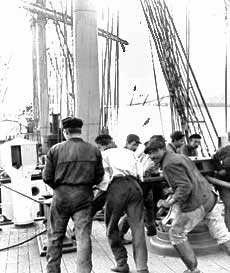Are we really that different?
Tim Lambert
Indians in the Making response
The history of Puget Sound is a very interesting one. As Alexandra Harmon states in her book, Indians in the Making, there were “hundreds of villages [of Native Americans] near Puget Sound”(8). When the Europeans came, they were able to trade liberally with most of the villages and tribes around the sound. Although the different cultures traded different things to each other, they both had the same thing in mind, to prosper economically.
The two cultures of Native Americans and Europeans were very different in the early 19th century. Aside from a completely different language, the Native Americans had small canoes and tiny villages around the Puget Sound. The Europeans, on the other hand, came on large ships and ripped forts out of the ground to satisfy their trading needs. Culturally, the differences were immense. The Native Americans were a people who’s custom it was “to consult doctors outside their community”(39). This action gave the Europeans an enlarged sense of accomplishment. They believed the Native Americans were forsaking their beliefs for those of the English, which was not the case. Spiritually, these cultures were also very different. The Europeans had religious values that were congruent with Christianity. Like in many other places where the Europeans landed, they were able to press some of the Puget Sound Native Americans to into their religion. One wealthy Native American named Tslalakum took a hold of Christianity and after a battle said his enemy lost because, “they did not know God, sang no canticles, and did not make the sign of the cross”(33). However, many Native Americans did keep their spiritual value of dancing, which was a huge part of their culture.
Even though these cultures had many differences, they also had one major thing in common: the idea that trade would make them prosperous. Trade was very big in the region before the Europeans came, but when they did come, it exploded. As Harmon states, “Before foreign traders appeared on Puget Sound, there were probably few, if any, occasions for large-scale, nonviolent gatherings of people who were complete strangers to each other” (36). The trades between the Native Americans mostly had to deal with people. Slaves and wives were popular trades which, in some cases, could bring peace between two different communities (37). After the Europeans arrived, trades became more object based, and much more widespread. On one documented occasion, “in 1835 Indians arrived from Spokane country, three hundred miles to the east and from Clackamas and John Day Rivers, south of the Columbia”(36). These people came from this far away to trade for objects that they previously did not have, which would make them stand out among their people.
The reason both of these cultures traded was to gain more than they lost, thus seeking a “profit”. As Harmon states, “Tales featuring characters who rose from humiliating poverty to admirable prosperity were favorites of native raconteurs” (35). However, the idea of "profit" was different for the two cultures. To the Europeans, profit meant accumulating wealth in the traditional form of money. To the Natives on the other hand, "social ties were the real indicators of wealth"(27). Even though the ideal of wealth is different for the two cultures, they shared to mindset to try to amass as much of it as possible. Natives like Waskalatchy (aka “the Frenchmen”) and Tslalakum (chief of the Suguamish) were two examples of men who were well to do before the Europeans arrived and were able to become more wealthy (in both ways) after they had settled in the Nisqually Vally.
The cultures of the Native Americans and Europeans from England were very different but shared one very large ideal: to accumulate wealth and have more of it than others. It is somewhat peculiar to think that a society untouched by the feudal system and capitalism could share a common goal with the creator of these two economic forms. It seems as humans, we tend to want to have more than others and hold ourselves in higher regard.

